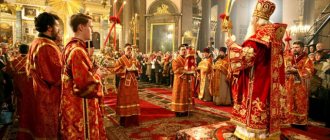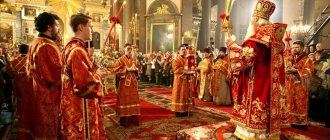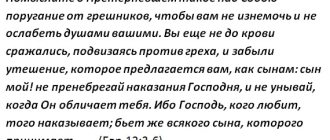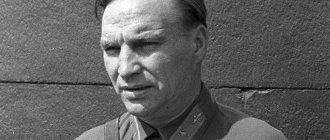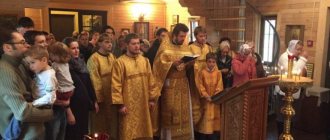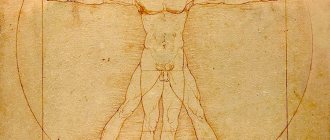Valery's childhood
As a child, Valery often went to an abandoned old church in the village. And although the boy was not a believer then, he felt the mystery of this place.
Origin and birth
Dukhanin Valery Nikolaevich, whose biography contains an amazing moment of gaining faith, grew up in an ordinary Soviet family. He was born on May 28, 1976 in the city of Orenburg.
Family
Valery's parents belonged to the category of employees. They were unbelieving people. There was no talk about God in the family.
The boy and his sister spent every summer in the village with their grandmother. In her house there were icons hanging on the wall. One night Valery saw his grandmother praying on her knees in front of them. Shortly before this, she almost died from a lightning strike - it passed into the ground very close.
When the grandmother invited her grandchildren to be baptized, they refused. Then Valery had no faith, he was indifferent to conversations about God.
Teenage years and early life
At the age of 13, Valery and his sister were baptized. He could not explain to himself why this decision arose. While performing the Sacrament of Baptism, the young man felt a change in his soul. He was overcome with joy and lightness. And there was no longer any doubt that God exists.
Spiritual education
Father Valery devoted his entire youth to improving the level of his spiritual education.
Stages:
- In 1992, the young man became a sexton and reader in the Church of the Intercession in his hometown.
- Later he moves to the capital.
- In 1996 he graduated from the Moscow Theological Seminary. In the temple located next to her, the young man carried out obedience.
- In 2000, the future clergyman received a diploma from the Moscow Theological Academy (MDA). While studying there, he was engaged in missionary and social work. He often visited people under investigation in pre-trial detention centers and talked with them about the Orthodox faith. He was also involved in organizing the collection of things and food for prisoners.
- While still studying at the MDA, the future priest worked as an assistant to the vice-rector for educational affairs.
He was a member of the Academic Missionary Department. He also taught at the theological courses open at the MDA.
Work in the seminary
In 2003, Valery Nikolaevich went to work at the Nikolo-Ugresh Seminary of the Moscow Patriarchate, which is located in the city of Dzerzhinsky, Moscow region. There he becomes vice-rector for academic affairs.
The priest also holds the position of teacher of Byzantine studies, apologetics, patrolology, and the foundations and methods of catechesis.
No. 34 (883) / September 6 '16
Conversations with the priest
In this topic:
Conversations with the priest
Archpriest Oleg Stenyaev: Martyrs are always winners
Conversations with the priest
Hegumen Peter (Eremeev): The first Moscow saint (September 6 - memory of St. Peter, Metropolitan of Moscow)
Father Valery, you came to us for the first time, we are very glad to see you in our Moscow studio. The topic of today's show is “Happy or Sad.” And before we move on to our dialogue, let's clarify what despondency is and what joy we will talk about today?
– I would probably like to speak informally on these issues, without delving into any complex things. I believe that joy in general should be the main characteristic of a Christian. Why? I will tell you my personal experience of contact with the Church. I was baptized when my parents were not even believers yet, did not yet go to church. And one day I, as well as my sister, cousin and her husband, went simply out of interest to receive the sacrament of Baptism, without even thinking about faith.
I was thirteen years old. As I remember now, when this sacrament was performed, I did not understand a single word that the priest pronounced, I did not understand a single ritual. But inside there was a clear feeling that the Lord God really exists, and some kind of indescribable feeling of joy and freedom. It's like someone took all the dirt out of you; An amazing joy appeared, something inside began to shine. This was my contact with the Church, with Christ. After this I understand that a true spiritual life must be permeated with joy.
Where does the Gospel proper begin? When the angels preach the gospel, they appear to the shepherds at the birth of Christ and say that “there is now joy for the whole world, because the Child Christ has been born.” It is estimated that the word “joy” or the commandment to “rejoice” is mentioned several hundred times in the Gospel. But we will not find a single commandment for a person to be despondent, gloomy, sad, or grieving. That is, joy is that light, that radiance that fills the heart, and that which inspires you in general.
Dejection is the vice of our time. People get depressed, worry about something all the time, talk about depression. Some researchers even say that depression is a cancer of the 21st century, a spiritual oncology. People believe that “everything around me is wrong,” “I can’t do anything,” “Nobody needs me,” “There’s no point.” A person carries all this within himself, experiences it, and a swamp forms inside him: stagnation, powerlessness, apathy and meaninglessness. This is what despondency is; this is the spiritual destruction that has afflicted modern people.
That is why it is also called a mortal sin.
- Yes. Why is it called “deadly sin”? Because it leads to the death of the soul. And despondency expresses this very much. Dejection is a state in which you have no life inside: complete apathy, powerlessness, you don’t want to do anything. And a person can lie like that, mired in the swamp of his internal apathetic feelings, not noticing anything bright around. Such a sin is truly mortal because it means that a person is without God. God is life, God is light, God is love. And a despondent person has darkness, joylessness, and apathy inside.
I would even say that despondency is a diagnosis of selfish people, when a person is focused on his own sinful passions: he wants everything only for himself, he only thinks about getting something for himself, achieving some benefit. And since this is impossible (we always encounter some kind of obstacles), this person begins to lose heart: they met me wrong there, they didn’t respond here, they didn’t help me here... And it turns out that this person begins to see only the bad. And why? Because in advance his attention was drawn to his “I”, his whole gaze was focused on himself. And this selfishness, isolation within oneself ultimately turns into inner emptiness. He is closed in on himself, and therefore he simply feels cramped from this internal constraint.
How to deal with this emptiness?
– The Holy Fathers, of course, talked a lot about how to deal with the sin of despondency. If this question is explained ascetically, then the sin of despondency is opposed to the virtue of sobriety, that is, internal wakefulness. If despondency is laziness, apathy and relaxation, then sobriety is inner wakefulness: organize yourself so that you have a clear rhythm. For example, I notice about myself that I start to feel depressed when I rest for too long. That is, when I leave the seminary, it seems that I disconnect from work and should rest, but instead, when I am without work for a long time, without an intense life, I feel some kind of despondency, a gloomy state inside. And as soon as I return to active activity, my despondency disappears as if by hand and something begins to shine inside, joy appears. That is, in fact, a person becomes depressed when he simply does not want to work, does not want to devote himself to some important matter.
In general, a lot can be said and compared on this topic. I recently learned about one of our modern ascetics, schema-hegumen Euthymius. He lived in Kazakhstan, lived for one hundred and five years and died just recently. At the same time, during his life he died three times and suffered a huge exile. What was the reason for his exile? He was born at the beginning of the 20th century into a large family. When the revolution occurred, they were faced with dispossession.
It turned out that the father died and the mother had to be imprisoned. And the brothers asked schema-hegumen Euthymius (then he was simply John): “Go and say that you didn’t find where mom is. And we’ll hide it.” He told representatives of the Bolshevik authorities that he could not find his mother because she had left. Before that, he had a terrible headache and his legs hurt. So what happens next? The Bolsheviks answered him: “If this is so, then we will exile you instead of your mother.” And he told me what joy he felt after these words! Immediately, both my head and legs stopped hurting. Why? Because he acted sacrificially, and his soul was revealed in this.
The reason for our despondency is that we become closed in on ourselves. When a person is closed in on himself, he will always be missing something, he will always be depressed and feel cramped inside. As soon as we learn sacrifice, we reveal ourselves, and there is a kind of opening of our ring, the shell in which we were closed. Then despondency disappears and joy appears within. So schema-abbot Euthymius immediately gained strength, he went through exile, and throughout all these difficult years that he spent in them, he experienced joy.
There are some interesting observations. It turns out that rich people (millionaires, billionaires) suffer the most from depression, and every fifth person has a medical diagnosis of depression, and very often there are even cases of suicide. And if you take beggars or homeless people, they have practically no suicides. It would seem that everything is the other way around: those who succeed, bathe in blessings and should rejoice, but those who are in constant deprivation. What's the secret here? The fact is that overcoming hardships constantly organizes a person internally, and he is in a state of internal wakefulness. Whereas a person who has achieved some benefits begins to calm down, but inside he has no silence, no peace and quiet. And it turns out that all the blessings and all the earthly joy cannot give him true joy.
We live in a society, and there are so many grumpy and offended people around us. Offended by fate, by the world around us, and so on. How should you behave with these people? They often say: “Don’t communicate with him, he is offended, he is a nasty person...” After all, there are many such people around. How can I help them?
“I remember from the patericon how one student comes to the elder and says: “I just can’t cope with the insult. What should I do?" He tells him: “As soon as you are offended by someone, put a potato in your bosom. If you’re offended again, put it down again.” He began to do this, and over time he accumulated a lot of potatoes, and then they began to rot. He comes to the elder and says: “I can’t carry all this on myself anymore.” The elder says: “See how unpleasant it is for you. But every resentment is something that is inside you, and also rots and bothers you.”
It is required of us that we ourselves do not be offended by other people, that we do not hold something inside against anyone. Because every insult is like a tight knot: when it is tightened, it squeezes you. And every grievance overcome is like untying this knot; it immediately becomes easier inside.
How to communicate with them? I think that you need to communicate with any people. Why? Because in many ways a person responds to your inner state. If you don’t reproach the person yourself, don’t get annoyed with him, then he begins to pick up on it. His aggression may also go away; and he will stop being offended. Therefore, I think the most correct decision is to treat any person internally with peace, love, understanding, and he, too, will stop having any grievances.
We have already found out: in order to overcome despondency, or, as we also call it, depression, you need to organize your life somehow differently. That is, it turns out, you need to go try again; if they don’t hire you, you need to try, somehow get through, that is, overcome yourself and do it through force. It is so?
- Of course, what does the Lord expect from us? The Lord expects activity from us. The Lord gave each one both arms and legs. For what? In order for us to walk with our feet, we do something with our hands. The Lord gave us a head so that it could work too. And the Lord does not expect us to sit at home and ask: “Give me from heaven...” - we must prove ourselves. Therefore, in Orthodoxy there is such a concept as synergy, assistance, when we personally try to do something ourselves and at the same time ask the Lord to help us with this. I know a lot of people who had some kind of hopeless situation and it was unclear what to do, but it’s enough to pray together, together from the heart (not sit on the sofa, don’t become limp, don’t give up, but pray and make some efforts ) – and everything is decided.
It’s just that our problem is that we often imagine some kind of sad prospect for life in advance. In fact, a person suffers most not from the fact that he had some kind of trouble, that he was fired, for example, but suffers from the fact that he begins to chew all this inside himself...
In the West, it is now very fashionable to seek help from psychologists to combat depression. What is the role of the priest in the lives of people suffering from this illness?
– Of course, the question is very difficult. I will say right away that turning to psychologists and psychotherapists is an earthly solution to some issues or problems. Psychology (as it is now) knows its own logic, that one must do this and that, and psychologists try to humanly, logically unravel some situations where there are their own patterns. But the fact is that the Lord God often acts illogically. How? For example, a person is sick and should die, but he prays, and the Lord heals him of his illness. That is, the logic of natural human life is violated, because when we turn to God (and the Lord is the King of our life, in His hands is the life and death of a person), He can remove any illness from us. Earthly psychology does not know this, it talks about some patterns, that if stress occurs, then you have a surge of emotions and this may entail some processes; that in a depressed state, hormones do not work as well and medications and psychotherapy are needed. Whereas any disease can be healed by God's grace.
The answer here is clear. When a person was in heaven, he did not suffer from any depression or neurosis. Why? Because there was complete harmony within the person himself. It was because there was harmony between man and God. And only when the harmony of a person’s relationship with God ceases, everything inside a person “collapses.”
In fact, what causes neuroses and neurotic states? As a rule, this happens due to internal contradictions. The man was sure that, for example, he would have a family. He gets married, and suddenly everything falls apart - his other half lets him down. An internal contradiction arises based on his previous hopes and aspirations (he doted on this person), and he leaves; and a complete breakdown... Or someone close to you dies - the same thing. Or there are other situations when a person wants to achieve something, but he fails. It is these internal contradictions that lead to mental breakdown.
Previously, there were fewer such contradictions, because life was more integral. As we read in Shmelev’s work “The Summer of the Lord,” where the entire life of a Russian person (meaning simple Russian peasants) was permeated with the Gospel, Christianity, starting with a simple meal (buns, buns) and until the very end (work, visiting a temple), – it was all seamless.
Now what happens? A person works at work - everything there is civil and mundane. Then he goes to the temple - and everything seems to change in the opposite direction. For example, a woman puts on a headscarf when entering a temple, because the etiquette is different, but she leaves the temple and again adjusts to a worldly lifestyle, behaves differently in the subway, and is once again afraid to cross herself. And we see a contradiction, a duality; integrity is gone. Because of this, a person can also break down inside, because he has no integrity, his life is divided.
Therefore, mental breakdowns go away when a person gains inner integrity. But psychologists and psychotherapists cannot restore integrity to a person. They help relieve some stress, help get out of some situations, but they cannot save the soul. Psychology doesn't even know the concept of a soul. Only the Lord with His grace can save a soul, and this meeting takes place in church, and here the confessor already helps. A confessor is a person who not only consoles, calms, and advises with his words, he turns a person to God, helps a person acquire God’s grace.
This is the difference between spirituality and psychotherapy, where simply earthly words work. It’s like, for example, you have a good friend who, in trouble, can really support you, console you, and encourage you. The same is done by a psychotherapist, who can explain everything correctly and relieve stress, but he cannot completely cure; a moment will come when the soul will break again. This is why family psychotherapists appear in the West; the need for them turns out to be constant; people fall all the time, sliding into the same hole. And only God's grace can heal a person.
Question from a TV viewer from Belgorod: “Ecclesiastes said in his book that there should be a time for everything: collecting stones, scattering them, crying and having fun. But let’s say, to rejoice... If a person lost his job, or was robbed, or he lost loved ones and at that moment begins to rejoice, how will those around him, close relatives, perceive this? They'll think he's crazy. Can you explain please".
– Thank you very much for this question. It is precisely at this moment that he should rejoice. Why? Because every sorrow is a visit from God. And the Lord is close to a person precisely when he sends such tests. I'll give you an example. At our seminary we have an economist, Deacon Vadim. His wife Ksenia was expecting a child; they were preparing for childbirth. And suddenly she developed some kind of terrible illness, her blood pressure jumped, and her kidneys eventually failed. The baby died very quickly, and she herself was under threat of death. At the hospital, Father Vadim was told: “Your wife will die, so don’t even hope.”
The elder, Schema-Archimandrite Eli, prayed for her. I tell the story of people I know personally. What happened next? Ksenia is recovering, that is, she did not die at that moment, but was connected to many catheters and various tubes. The fluid that collected in the catheters was black because her body was poisoned. Father Vadim brought her Epiphany water. The entire medical staff was indignant: “What did you bring?!” And when Ksenia began to drink Epiphany water, before everyone’s eyes, the liquid in the black catheter began to lighten, because miraculously her body began to be cleansed from communion with holy water. But that's not even what I'm talking about.
At the same time, in the next room there was a young mother who had given birth to a child. But her husband came to her, made a scandal, hit her hard and left. The woman was very depressed. And Ksenia, despite the fact that she was not allowed to get up, when she heard that the woman was crying, she immediately responded. She disconnected all the tubes, all the catheters, stood up, walked along the wall to her and began to console her. It was a maternity hospital, and that woman, not knowing anything about Ksenia, said: “It’s good for you, you gave birth to a child, but my husband left me.” Ksenia replied: “I lost a child, but the Lord gave it to you. Therefore you should rejoice.” This is how Ksenia supported a woman in trouble. The doctors, seeing that Ksenia got up on her own, were shocked. And when they asked why she did this, she replied: “Yes, I feel bad, but it’s even worse for her.”
Ksenia herself did not lose heart at all, did not fall into depression, because she perceived this as a special test. And every trial strengthens us. Therefore, I think, especially when we are presented with some kind of trouble (something with work or some kind of sorrow in life), then this is the very moment when we must say: “Glory to Thee, Lord, that You have given me this.” sent." It is at such a moment that a person’s prayer is most sincere, and the Lord hears such a person.
There is also this observation: the Lord closes some doors, and opens others. That is, if you are fired from some job, it means that you have passed this stage and something new is beginning for you, something else will certainly be sent to you. There is no need to become discouraged, we need to understand that the Lord is always next to us, He will always give us something, He will lead us out of any situation. And if you need to endure something, then you need to accept it as the will of God.
Before a person becomes despondent, there are some symptoms, little alarm bells. Can I list them to somehow warn myself?
– I think everyone can remember this. Saint Theophan the Recluse wrote that despondency manifests itself in boredom, when we begin to be bored by anything. For example, when a person studies, he is bored in class; if he works, he is bored at work; he is bored in church when he comes there; he is bored in praying and does not want to pick up a prayer book. That is, internal cooling occurs, processes freeze. When frost sets in in winter, all living things freeze, and some even hibernate. Here, despondency is a kind of hibernation in the spiritual sense. It is important to track all this in advance and immediately organize yourself, try to counteract this with some kind of active rule.
For example, when I studied at the Lavra, we could specially get up at five in the morning and go to a fraternal prayer service. It seems that it’s already hard, you should sleep, but it turns out that when you get up early, go to a prayer service to St. Sergius, venerate the holy relics, then everything inside you is somehow rebuilt, everything becomes clearer, you become cheerful and active. I don’t know how to explain this by natural reasons, but in a spiritual sense all this is very effective.
What else can you pay attention to? You definitely get discouraged when you think that someone doesn’t understand you, someone doesn’t meet you halfway, that you can’t do anything. If a person thinks so, it means that he is already slipping into despondency, falling into sadness. And this is a misconception. After all, the Lord gave us life, we were created in the image of God, and nothing compares to this. The soul is immortal, and the Lord calls us to endless joy in the eternal Kingdom of God. What could be higher than this? Something is definitely given to us: close people with whom we can communicate, they make us very happy. There are people who expect some kind of help from us, and it turns out that if we start helping them, we ourselves will be happy about it.
Father Valery, finally, I ask you to bless our television viewers.
- Lord grant that we all have true joy - the joy of contact with the Lord, that we go to church and learn to please each other, our family and friends. God bless everyone!
Recorded by: Nina Kirsanova
You can view or listen to the full version of the conversation on the website of the Soyuz TV channel.
In other rooms:
Mature age
The priest combines church activities, work at the seminary and participation in television programs. In his programs, he talks about Orthodoxy, which is important for believers and for those who are just on the path to gaining faith.
Church service
On March 2, 2014, he was ordained deacon. On October 8 of the same year, His Holiness Patriarch Kirill ordained him as a presbyter in the Trinity-Sergius Lavra.
Priest Valery Dukhanin serves in the Church of the Icon of the Mother of God of Kazan and sometimes in other churches of the Nikolo-Ugreshsky Monastery. He also conducts his sermons there.
The names of some of them:
- "On Epiphany."
- “The harmfulness of sin and its overcoming.”
- "When you can do good."
The priest conducts discussions in Orthodox gymnasiums, Sunday schools, and theological circles. He also participates in meetings and conferences dedicated to spiritual life.
O. Valery is married and has three children.
Participation in TV shows and radio
In addition to church services, the priest is involved in television activities as part of his missionary work.
The priest took part in television programs:
- "Lessons of Orthodoxy".
- "Sunday School".
- "The Light of Ugreshi"
- "SO-YOU."
- "The phenomenon of faith."
In the first program on the list, aired on the Soyuz TV channel, the priest conducted a series of lessons about asceticism and the works of St. Ignatius (Brianchaninov).
In the “Sunday School” program, the presenter, Fr. Valery and the children talk about prayer, Orthodox holidays, saints, friendship and much more. One of the issues was dedicated to the holidays and how to use them for the benefit of schoolchildren.
Father several times was a guest of the “Light of Ugreshi” program.
The priest was an expert in the youth club “SO-Y” held on the TV channel “My Joy” from 2013 to 2014.
As part of the program “The Phenomenon of Faith,” he gave thirty television lectures (2011-2012).
Titles of some topics:
- "The meaning of suffering."
- "Superstition".
- “Do all religions lead to one god?”
Father often answers questions from viewers on the Spas and Soyuz TV channels.
On Radio Radonezh he hosts his own program “The Hidden World of Orthodoxy,” where he touches on the topic of faith in modern life.
Fighting the disease
In June 2022, the priest was a guest of the program “I really want to live” on the Spas TV channel. The program, hosted by Daria Dontsova, is dedicated to the experience of fighting cancer and its spiritual component. In March 2022, Fr. Valery learned about his diagnosis. The priest talks about the way to overcome the disease.
Believers on Orthodox resources call for prayer for the health of the priest.
BETRAYAL, PAPISM AND US
Priest Valery Dukhanin
The article was written as a response to the unexpected support of Ukrainian schismatics from Patriarch Theodore II of Alexandria.
Weakened Alexandria gave way to the city of a thousand minarets - Cairo. And here are some statistics. In Egypt, 90% of the population are Muslims, and less than half a percent are Orthodox Christians. Within the canonical territory of the Patriarchate of Alexandria (that is, within the whole of Africa), the Monophysites outnumber the Orthodox by more than ten times.
Nowadays, pitiful reflections of the former greatness have been preserved only in the title of the Primate, called, no less, “the thirteenth apostle and judge of the Universe.” The title is in stark contrast to reality. The struggle for survival, the struggle against poverty, the struggle for the opportunity to be present in society - this is what characterizes the Patriarchate of Alexandria in the last centuries of its history.
The Ottoman Empire completed the alignment, the system of relations between the Greek Primates, which in many ways we observe now. When the royal city of Byzantium fell under the onslaught of the desperate Ottomans, Sultan Mehmed II took a wise step in his own way - he appointed the Primate of Constantinople as head of all the Orthodox Christians of his sultanate. So the Patriarch became the ethnarch, leader and representative of the Christian peoples in the face of the Sultan. Greece and Asia Minor, Syria and Palestine, Egypt and North Africa - the Orthodox inhabitants of all these places submitted to the Patriarch of Constantinople as their head. That is why the Primates of Alexandria, Antioch, Jerusalem, not to mention the rest, were considered to be an order of magnitude lower hierarchs. They were included in the same sultanate, but were subordinate to the Patriarch, who lived in Istanbul. He was responsible for the behavior of Christians and was responsible for their obedience. One after another, the autocephalies of the Local Churches, in particular the Serbian and Bulgarian, were abolished - after all, their peoples submitted to the Ottomans. Russia - oh miracle! - remained the only Orthodox country not conquered by the proud Ottomans. For all Christians of the Ottoman Empire, the Patriarch of Constantinople was considered the head. He appointed whoever he wanted as Primate to any famous department, while the Patriarch himself was subordinate to the Sultan.
The Ottoman Empire has long since disappeared from the scene. The Turks, beaten more than once by the Russian army and navy, gave way to stronger powers. But how difficult it is to change an established custom! 400 years of custom have turned it into an unwritten law. How difficult it is to no longer be considered a leader and a leader, a head for everyone! To this day, the Patriarch of Constantinople calls himself, as stated in the tomos for Ukrainian schismatics, the head for all Patriarchs and Primates, making categorical judicial decisions for all Local Churches. How difficult it is, being in Istanbul, where less than a thousand Orthodox Christians live, where the Patriarch does not have the power to put a cross even over his own church, where five times a day he listens to the singing of the muezzin, - not to get carried away by politics, ecumenism, intrigue and attempts to influence others. To influence, the connections of the powerful (such as the US State Department) are used, and divisions in states, peoples and countries are also used. Politics knows no loyalty. She, like a harlot, gets confused where the benefit is seen at the moment. And therefore, the one who in the Church puts politics above dogmas and canons will certainly fail, deceive, and betray.
Politics has brought the Patriarchate of Constantinople into a dead end more than once. This is what happened in Lyon in 1274, at the cathedral, called the XIV Ecumenical Council by Catholics. Representatives of the Patriarchate of Constantinople recognized the Pope as the head of the Church, included the “filioque” in the creed, and agreed with the possibility of celebrating the Eucharist on unleavened bread. Soon, John XI Vekkos, appointed Patriarch of Constantinople, fully accepted the union. Supporters of the union yielded to the policy of Emperor Michael VIII Palaiologos, who feared a military invasion from the Sicilian king Charles of Anjou and therefore sought the support of the Pope. But in the end, the Patriarch of Constantinople himself suffered. After some three years, at a local Council in Thessaly, Patriarch John Vekkos was deposed and deprived of the patriarchate. The church people did not accept the union. And in 1281, the Catholics also came to their senses - the new Pope Martin IV broke the union with Constantinople. This was the case with the notorious Union of Florence in 1439. Concluded in order to save Constantinople from the approaching thundercloud of the Ottomans, the union only aggravated discord, led to a split within the church people, and never saved Constantinople.
Is it possible to consider a department that has betrayed Orthodoxy more than once as the head over other Churches, the first not only in status, but also in power? Is it possible to recognize its decisions as categorically correct?
The departments dependent on Constantinople surrender. In the obvious betrayal of the Primate of Alexandria, in his obvious betrayal of his own previous position, obvious weakness is manifested. Money (more precisely, very big money), and dependence on the powers that be, and intrigue, and so-called ethnophyletism can be a weakness. Ethnophyletism is the preference for unity in blood over unity in truth. With this approach, for a Greek it is better to be one of his own, albeit a dishonest one, than an honest stranger. It seems to a weak soul that politics, money, national kinship will help more on earth than God, the Church, pure faith. This is the true face of betrayal.
And yet I dare to say that there is nothing unusual in the betrayals themselves. Just as Adam betrayed God, and Judas betrayed Christ, so deception and betrayal are inevitable in our world. The Church in history repeats the path of the Savior Himself. The Lord went through the betrayal of loved ones. And therefore Christians will certainly be betrayed by someone. “You will also be betrayed... by your brothers” (Luke 21:16), the Savior predicted, but He also added: “And a hair of your head will not perish; with your patience save your souls” (Luke 21:18-19). Yes, betrayal is a wound, but far from mortal. The sun will not set on someone else's betrayal. The sources of water will not dry up, the trees and grass will not wither, and Orthodoxy on earth will not lose its light and glory. The blessings will not be cut short and the rivers of living water – the Holy Spirit – will not become scarce, for the gates of the underworld will not prevail against the Kingdom of God revealed on earth.
Alas, communication is impossible with someone who himself ran away, selling you for thirty pieces of silver, who supported self-appointed bishops who do not have apostolic succession. And just as it is impossible to communicate with someone who is drunk or in the grip of a narcotic dope, so it is impossible to have church communication with someone who is engulfed in the spirit of intrigue and cynical betrayal.
And yet I feel sorry for every traitor. He has cut himself off from unity and spiritual kinship, secretly hiding in the darkness of his weakness and self-interest. This is how the imaginary brother who left the Supper of Love once hid from the apostles, and he himself felt the abyss of his cutting off from the Source of life.
Everything that God allows is a lesson for each of us. You see how shameful it is to be a traitor - do not betray yourself, do not act basely and basely towards your neighbors. Do not betray your own family, and you will not become a traitor to the Church, for the family is a small Church. You see how shameful it is to support schismatics - do not scold the priesthood of your native Church. You see how vilely they are treating our Primate - support the Patriarch with your prayers. You see how pitiful someone’s claims to leadership in the Church are - show yourself an example of humility.
The temptation of papism is a temptation, by and large, for each of us. This is a temptation for anyone who has gained even a little power over others. Thus, any leader of any team can become a “Pope of Rome” in miniature. This is a temptation to act solely out of personal ambitions, following everyone else. The “Pope” can be the head of the family, who decides everything with his imperious “I said so” and “I want it so.” In other families, this status is not necessarily occupied by the husband. Let's remember the main character of Pushkin's fairy tale about the fisherman and the fish. According to the first handwritten version of the tale, the old woman, at the peak of her imperious dreams, demanded “to be the Pope.”
Papism is the building of the Tower of Babel, but whoever climbs it will never be satisfied. Papism carries two strangely combined things - pride and frivolity, and inevitably ends in collapse, a broken trough, lost unity of people and ruined destinies.
And here are some simple truths: the Church is not an empire, not a sultanate, not a sphere for personal ambitions or crafty politics. The Church is the Body of Christ, a living connection with the Living Christ. The Head of the Church is not the Patriarch of the Ecumenical Throne, but the Lord Jesus Christ (cf. Eph. 5:23), who gave Himself for our salvation, who came, as He Himself said, not “to be served, but to serve and give His soul.” His own for the ransom of many” (Mark 10:45). Service to the Church can only be in the image of Christ - sacrificial, and not self-interested, judicious and humble, and not proud and domineering. “Whoever wants to be first must be last of all and servant of all” (Mark 9:35).
The Church is not divided into Greeks, Romanians, Georgians or Russians. Everything in the Church is God’s. Here everyone is our own, for everyone is Christ’s. All are called to inherit the resurrection, in which they “are like the angels of God in heaven” (Matthew 22:30). Angels in Heaven have no nationality. And therefore, guardian angels, caring for people, do not give preference to one nation or another. The Kingdom of God is not divided into divisions based on earthly divisions. One love of God, one grace of the Holy Spirit is open to everyone, regardless of the place of birth or social status of a Christian. The one who is closer to the Most Holy Trinity, whose name is Love, achieves greater glory. Will everyone understand this? Everything, but not right away! Someone will understand only after leaving the earthly world with its stupid struggle, with its illusory statuses, titles, and national differences. All we have to do is accept what the Lord allows. Do not become embittered, but pray and have pity on those who have fallen away. God leads along the path of trials. And he will certainly bring it out. This is how gold is purified in the furnace.
Writing activity
The priest is known for his publications and books. His articles and works often touch on topics related to the lives of people in the modern world with its temptations.
Publications
Since 2004, a large number of articles by the clergyman have been published. Most of them are about life in the modern world.
Some of his publications:
- In the article “About Yoga and Other Eastern Practices” Fr. Valery warns about the harm to the soul of people who practice meditation and yoga (Pravoslavie.ru website, 2014).
- In the publication “What are the dangers of our sinful passions” (Pravoslavie.ru, 2016), he explains the bondage we are in.
- In the article “Why Shouldn’t a Christian Participate in Halloween?” three answers from priests were posted: Priest Valery Dukhanin, Archpriests Theodore Borodin and Andrei Efanov (“Pravoslavie.ru”, 2018). Father Valery writes that Halloween is “flirting with dark power.” He calls on everyone who took part in this “holiday” to confess.
Also, some of the articles are devoted to the inadmissibility of practicing the occult.
Books
In addition to articles, many books by the archpriest have been published, which are recommended by the Publishing Council of the Russian Orthodox Church. Most of them are dedicated to the Sacraments of the Russian Orthodox Church.
In the book “The Hidden World of Orthodoxy” (2006) Fr. Valery reflects on the reasons for unbelief, on the meaning of the Lord’s commandments, on life in the modern world.
The works “The Hidden Gift” and “How to Learn Correct Prayer” (2016) were written based on the works of St. Ignatius (Brianchaninova). Two years earlier, the book “The Life of St. Ignatius (Brianchaninov)” was published.
In his books, the priest warns against engaging in the occult and reading esoteric books. He gives many examples when, having succumbed to sin, people paid heavily for it.
In the work “Protect us, Lord, from superstitions, occultism, and corruption,” the author classifies hypnosis as an occult method. A person exposed to this method of influence becomes more susceptible to the influence of dark forces. The book talks about the consequences of being interested in the occult and provides examples.
The priest warns against turning to healers who “treat” with prayer and the cross. The priest also touches on the topics of fortune telling, damage, and astrology. The author also thinks about why people are prone to superstitions.
The priest writes that illnesses and sorrows sent to us by God's Providence contribute to the salvation of the soul.
Books about. Valeria help Orthodox Christians not to stray from the right path, and doubting people to find faith.

